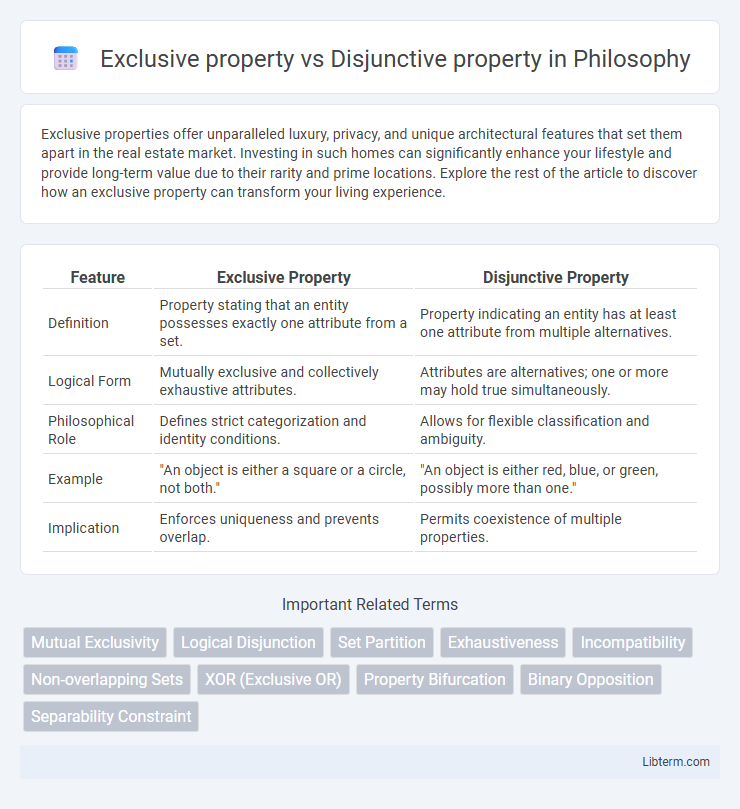Exclusive properties offer unparalleled luxury, privacy, and unique architectural features that set them apart in the real estate market. Investing in such homes can significantly enhance your lifestyle and provide long-term value due to their rarity and prime locations. Explore the rest of the article to discover how an exclusive property can transform your living experience.
Table of Comparison
| Feature | Exclusive Property | Disjunctive Property |
|---|---|---|
| Definition | Property stating that an entity possesses exactly one attribute from a set. | Property indicating an entity has at least one attribute from multiple alternatives. |
| Logical Form | Mutually exclusive and collectively exhaustive attributes. | Attributes are alternatives; one or more may hold true simultaneously. |
| Philosophical Role | Defines strict categorization and identity conditions. | Allows for flexible classification and ambiguity. |
| Example | "An object is either a square or a circle, not both." | "An object is either red, blue, or green, possibly more than one." |
| Implication | Enforces uniqueness and prevents overlap. | Permits coexistence of multiple properties. |
Definition of Exclusive Property
An exclusive property is a characteristic that cannot coexist with another specific property within the same entity, ensuring mutual exclusivity in classification or assignment. In contrast, a disjunctive property allows an entity to possess one among multiple non-overlapping properties without restriction. Exclusive properties are crucial in ontology design and data modeling to maintain consistency and prevent conflicting attribute assignments.
Definition of Disjunctive Property
A disjunctive property is a characteristic in ontology or data modeling where an entity can possess one or more values from a defined set, meaning the property values are mutually exclusive alternatives but not necessarily limited to one choice. Unlike an exclusive property, which restricts an entity to a single unique value, a disjunctive property allows selection among multiple non-overlapping options within the schema. This concept supports flexible categorization and classification by enabling entities to hold alternative property states without violating logical consistency.
Legal Framework of Exclusive Ownership
Exclusive property grants sole legal rights to an individual or entity to possess, use, and transfer assets without interference from others, firmly established within property law to ensure clear ownership and control. Disjunctive property describes assets or rights that belong to multiple parties but are separable and individually exercisable, often seen in joint tenancy or tenancy in common arrangements. The legal framework of exclusive ownership prioritizes exclusive possession and control, supported by statutory regulations and case law that prohibit unauthorized use or claims by third parties.
Legal Framework of Disjunctive Ownership
Disjunctive ownership refers to a legal framework where multiple co-owners hold separate shares in a property, allowing each to use their portion independently without affecting others' rights. In contrast, exclusive property rights grant sole ownership and control to a single individual, preventing others from accessing or using the asset. The disjunctive ownership framework necessitates clear legal provisions to manage disputes, transfer rights, and ensure protection of each owner's interests within shared properties.
Rights and Responsibilities of Exclusive Property Holders
Exclusive property rights grant holders full control over use, transfer, and exclusion of others, enabling clear legal ownership and protection against infringement. Holders bear responsibilities such as maintaining the property, complying with zoning laws, and paying taxes, ensuring sustainable and lawful use. Disjunctive property rights, by contrast, allow shared or divided stakes with limited control, often complicating enforcement and responsibility allocation.
Rights and Responsibilities in Disjunctive Property
Disjunctive property in legal terms refers to ownership where rights and responsibilities are divided among co-owners, allowing each party to independently possess, use, or dispose of their interest without affecting others. Each co-owner bears the responsibility to maintain their share and is accountable for liabilities proportional to their ownership stake. Unlike exclusive property, where a single owner holds full control and obligations, disjunctive property requires clear delineation of duties among multiple parties to prevent conflicts.
Advantages of Exclusive Property
Exclusive properties ensure that an asset or resource belongs to a single entity at any given time, preventing conflicts and ambiguities in ownership or usage rights. This exclusivity enhances security, facilitates clear legal protection, and simplifies management by reducing overlap and disputes. Organizations benefit from exclusive properties as they improve accountability and streamline decision-making processes related to asset control.
Advantages of Disjunctive Property
Disjunctive property enables the assignment of multiple distinct values to a property without restrictions, enhancing flexibility in data representation and classification. This advantage supports richer semantic relationships by allowing diverse, non-overlapping categories to coexist within ontologies or databases. Consequently, it improves query accuracy and data interoperability by accommodating varied and comprehensive property assertions.
Common Scenarios for Each Property Type
Exclusive properties commonly arise in situations involving roles or attributes that must be uniquely assigned, such as a person's social security number or a vehicle's registration plate, ensuring no overlap between individuals or objects. Disjunctive properties appear frequently in classification systems where entities belong exclusively to one category within a set, like biological taxonomy where a species cannot simultaneously be classified under two distinct genera. These property types help maintain data integrity and prevent conflicting assignments in databases, ontologies, and knowledge representation frameworks.
Choosing Between Exclusive and Disjunctive Property
Choosing between exclusive and disjunctive properties depends on the nature of the data relationships in ontology design. Exclusive properties enforce that an individual can have only one value for a property, ensuring data integrity in mutually exclusive scenarios. Disjunctive properties allow multiple values without overlap, useful when properties represent distinct but non-overlapping categories, optimizing semantic clarity and reasoning accuracy.
Exclusive property Infographic

 libterm.com
libterm.com